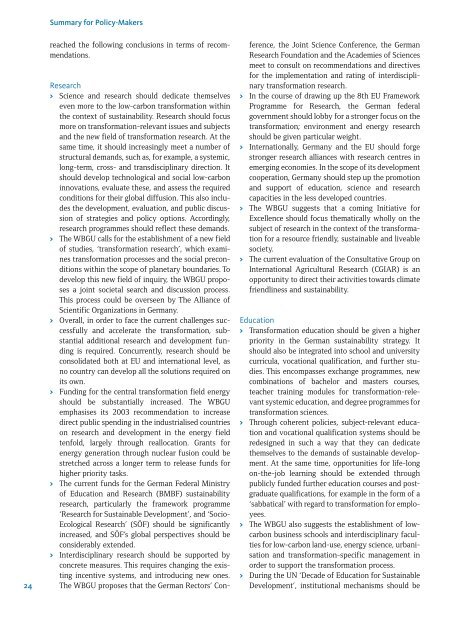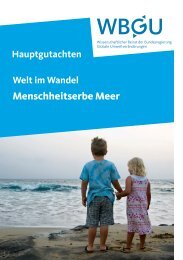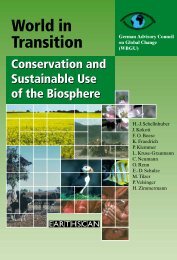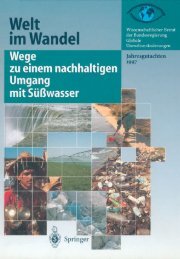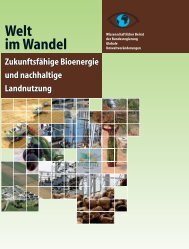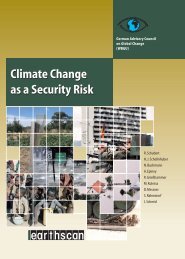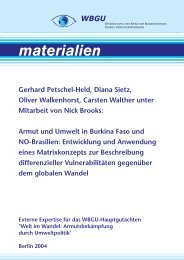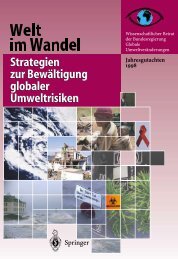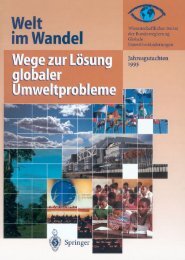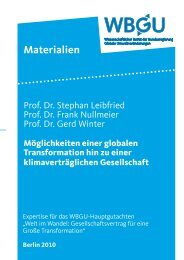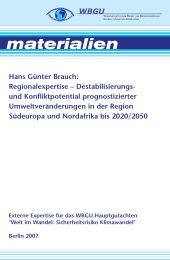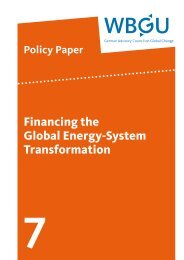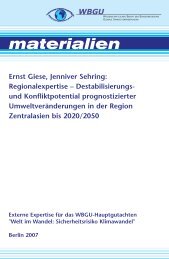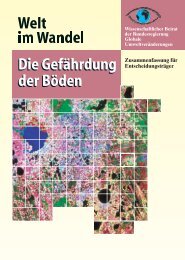World in Transition: A Social Contract for Sustainability - WBGU
World in Transition: A Social Contract for Sustainability - WBGU
World in Transition: A Social Contract for Sustainability - WBGU
Create successful ePaper yourself
Turn your PDF publications into a flip-book with our unique Google optimized e-Paper software.
24<br />
Summary <strong>for</strong> Policy-Makers<br />
reached the follow<strong>in</strong>g conclusions <strong>in</strong> terms of recommendations.<br />
Research<br />
> Science and research should dedicate themselves<br />
even more to the low-carbon trans<strong>for</strong>mation with<strong>in</strong><br />
the context of susta<strong>in</strong>ability. Research should focus<br />
more on trans<strong>for</strong>mation-relevant issues and subjects<br />
and the new field of trans<strong>for</strong>mation research. At the<br />
same time, it should <strong>in</strong>creas<strong>in</strong>gly meet a number of<br />
structural demands, such as, <strong>for</strong> example, a systemic,<br />
long-term, cross- and transdiscipl<strong>in</strong>ary direction. It<br />
should develop technological and social low-carbon<br />
<strong>in</strong>novations, evaluate these, and assess the required<br />
conditions <strong>for</strong> their global diffusion. This also <strong>in</strong>cludes<br />
the development, evaluation, and public discussion<br />
of strategies and policy options. Accord<strong>in</strong>gly,<br />
research programmes should reflect these demands.<br />
> The <strong>WBGU</strong> calls <strong>for</strong> the establishment of a new field<br />
of studies, ‘trans<strong>for</strong>mation research’, which exam<strong>in</strong>es<br />
trans<strong>for</strong>mation processes and the social preconditions<br />
with<strong>in</strong> the scope of planetary boundaries. To<br />
develop this new field of <strong>in</strong>quiry, the <strong>WBGU</strong> proposes<br />
a jo<strong>in</strong>t societal search and discussion process.<br />
This process could be overseen by The Alliance of<br />
Scientific Organizations <strong>in</strong> Germany.<br />
> Overall, <strong>in</strong> order to face the current challenges successfully<br />
and accelerate the trans<strong>for</strong>mation, substantial<br />
additional research and development fund<strong>in</strong>g<br />
is required. Concurrently, research should be<br />
consolidated both at EU and <strong>in</strong>ternational level, as<br />
no country can develop all the solutions required on<br />
its own.<br />
> Fund<strong>in</strong>g <strong>for</strong> the central trans<strong>for</strong>mation field energy<br />
should be substantially <strong>in</strong>creased. The <strong>WBGU</strong><br />
emphasises its 2003 recommendation to <strong>in</strong>crease<br />
direct public spend<strong>in</strong>g <strong>in</strong> the <strong>in</strong>dustrialised countries<br />
on research and development <strong>in</strong> the energy field<br />
tenfold, largely through reallocation. Grants <strong>for</strong><br />
energy generation through nuclear fusion could be<br />
stretched across a longer term to release funds <strong>for</strong><br />
higher priority tasks.<br />
> The current funds <strong>for</strong> the German Federal M<strong>in</strong>istry<br />
of Education and Research (BMBF) susta<strong>in</strong>ability<br />
research, particularly the framework programme<br />
‘Research <strong>for</strong> Susta<strong>in</strong>able Development’, and ‘Socio-<br />
Ecological Research’ (SÖF) should be significantly<br />
<strong>in</strong>creased, and SÖF’s global perspectives should be<br />
considerably extended.<br />
> Interdiscipl<strong>in</strong>ary research should be supported by<br />
concrete measures. This requires chang<strong>in</strong>g the exist<strong>in</strong>g<br />
<strong>in</strong>centive systems, and <strong>in</strong>troduc<strong>in</strong>g new ones.<br />
The <strong>WBGU</strong> proposes that the German Rectors’ Con-<br />
ference, the Jo<strong>in</strong>t Science Conference, the German<br />
Research Foundation and the Academies of Sciences<br />
meet to consult on recommendations and directives<br />
<strong>for</strong> the implementation and rat<strong>in</strong>g of <strong>in</strong>terdiscipl<strong>in</strong>ary<br />
trans<strong>for</strong>mation research.<br />
> In the course of draw<strong>in</strong>g up the 8th EU Framework<br />
Programme <strong>for</strong> Research, the German federal<br />
government should lobby <strong>for</strong> a stronger focus on the<br />
trans<strong>for</strong>mation; environment and energy research<br />
should be given particular weight.<br />
> Internationally, Germany and the EU should <strong>for</strong>ge<br />
stronger research alliances with research centres <strong>in</strong><br />
emerg<strong>in</strong>g economies. In the scope of its development<br />
cooperation, Germany should step up the promotion<br />
and support of education, science and research<br />
capacities <strong>in</strong> the less developed countries.<br />
> The <strong>WBGU</strong> suggests that a com<strong>in</strong>g Initiative <strong>for</strong><br />
Excellence should focus thematically wholly on the<br />
subject of research <strong>in</strong> the context of the trans<strong>for</strong>mation<br />
<strong>for</strong> a resource friendly, susta<strong>in</strong>able and liveable<br />
society.<br />
> The current evaluation of the Consultative Group on<br />
International Agricultural Research (CGIAR) is an<br />
opportunity to direct their activities towards climate<br />
friendl<strong>in</strong>ess and susta<strong>in</strong>ability.<br />
Education<br />
> Trans<strong>for</strong>mation education should be given a higher<br />
priority <strong>in</strong> the German susta<strong>in</strong>ability strategy. It<br />
should also be <strong>in</strong>tegrated <strong>in</strong>to school and university<br />
curricula, vocational qualification, and further studies.<br />
This encompasses exchange programmes, new<br />
comb<strong>in</strong>ations of bachelor and masters courses,<br />
teacher tra<strong>in</strong><strong>in</strong>g modules <strong>for</strong> trans<strong>for</strong>mation-relevant<br />
systemic education, and degree programmes <strong>for</strong><br />
trans<strong>for</strong>mation sciences.<br />
> Through coherent policies, subject-relevant education<br />
and vocational qualification systems should be<br />
redesigned <strong>in</strong> such a way that they can dedicate<br />
themselves to the demands of susta<strong>in</strong>able development.<br />
At the same time, opportunities <strong>for</strong> life-long<br />
on-the-job learn<strong>in</strong>g should be extended through<br />
publicly funded further education courses and postgraduate<br />
qualifications, <strong>for</strong> example <strong>in</strong> the <strong>for</strong>m of a<br />
‘sabbatical’ with regard to trans<strong>for</strong>mation <strong>for</strong> employees.<br />
> The <strong>WBGU</strong> also suggests the establishment of lowcarbon<br />
bus<strong>in</strong>ess schools and <strong>in</strong>terdiscipl<strong>in</strong>ary faculties<br />
<strong>for</strong> low-carbon land-use, energy science, urbanisation<br />
and trans<strong>for</strong>mation-specific management <strong>in</strong><br />
order to support the trans<strong>for</strong>mation process.<br />
> Dur<strong>in</strong>g the UN ‘Decade of Education <strong>for</strong> Susta<strong>in</strong>able<br />
Development’, <strong>in</strong>stitutional mechanisms should be


